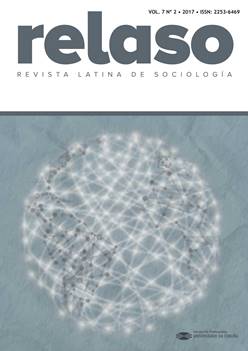Aesthetics of existence and creative resistances. From the epistemologies of the South to trans thinking
Main Article Content
Abstract
In the last decades, critical thinking has undergone two turns or displacements that are fundamental in the work of mapping (or inventing) silenced (or unpublished) possibilities of world and community. The first is due to the epistemologies of the South (Boaventura do Santos), born within the decolonial theory; the second comes from the feminist thought and is presently its vanguard: transfeminism. Here we want to develop a dialogue or hybridization between the two turns, trying to develop the following hypotheses, first: that the epistemologies of the South, as well as the "feminism of women" find a critical limit, a double bind according to which they can not abandon the logic of discourse that they fight and re-insert itselves (albeit problematically) in the molar affairs of identity, universality, etc.; second, that the “trans” of transfeminism presupposes an ontological conception that is profoundly decolonial but above all anti-metaphysical, which is invaluable for the articulation of a radical critique of current logics of global governance; third: that the first displacement (from north to south) allows us and almost obliges us to give way to the second (south to trans). The conclusions of our essay point to the mapping of the “trans” as a space from which to articulate effective resistances given the current conditions of thought. This affects the possible forms of science and social and human research, but the most serious consequences are certainly existential and political and must be applied to the everyday construction of the world through the relational ecological bodies in which we consist.
Keywords:
Downloads
Metrics
Article Details
References
Arendt, Hannah. 1998. La condición humana. Barcelona: Paidós.
Aristóteles. 1999. Política. Madrid: Gredos.
Braidotti, Rosi. 2002. Metamorfosis. Madrid: Akal.
Braidotti, Rosi. 2014. METAMORPHIC OTHERS AND NOMADIC SUBJECTS. Text written for the exhibition by Oliver Laric at ar/ge kunst Galerie Museum, 28.11.2014 – 24.01.2015. Disponible en http://www.argekunst.it/wp-content/uploads/2014/11/Metamorphic-Others-and-Nomadic-Subjects1.pdf (Última revisión 29/08/2017)
Castro-Klarén, Sara. 1997. “Corpo-rización tupí y Léry y el Manifiesto Antropófago” en Revista de Crítica Literaria Latinoamericana, año XXIII, n° 45. Lima-Berkeley.
Cruz, María Angélica, Reyes, María José, & Cornejo, Marcela. 2012. Conocimiento Situado y el Problema de la Subjetividad del Investigador/a. Cinta de moebio, (45), 253-274. https://dx.doi.org/10.4067/S0717-554X2012000300005
Deleuze, Guilles. 1994. ¿Qué es la filosofía? Barcelona: Anagrama.
Deleuze, Guilles y Guattari, Félix. 2002. Mil mesetas. Valencia: Pre-Textos.
De Sousa Santos, Boaventura. 2009. Una epistemologías del sur: la reinvención del conocimiento y la emacipación social. México: Siglo XXI: CLACSO.
De Sousa Santos, Boaventura. 2011. Introducción: las epistemologías del sur. Conferencia en el Foro Social Mundial. Disponible en http://www.boaventuradesousasantos.pt/media/INTRODUCCION_BSS.pdf (última revisión 20/8/2017)
Foucault, Michel. 1984. La ética del cuidado de uno mismo como práctica de libertad. Entrevista realizada por Raúl Fornet-Betancourt, Helmut Becker y Alfredo Gómez-Muller el 20 de enero de 1984. Publicada en la Revista Concordia 6, pp. 96-116.
Juanena, Coro J.A. 2016. Mujeres Indígenas, feminismo y condición postcolonial. “Lectora : revista de dones i textualitat”, Núm. 22 (2016) , p. 27-42 (Dossier: Transnational Indigenous Feminisms).
Lugones, María. (2008) “Colonialidad y género”. Tabula Rasa. Bogotá - Colombia, No.9: 73-101, julio diciembre.
Manifiesto Transfreminista Transfronterizo. 2010. Transformando feminismos – transformando fronteras. Disponible en http://www.sindominio.net/karakola/IMG/pdf_Manifiestofinal2.pdf
POST-OP. 2014. De placeres y monstruos: interrogantes en torno al postporno. En Transfeminismos. Epistemes, fricciones y flujos, Txalaparta ed. Tafalla: Txalaparta. pp. 193-211.
Preciado, Beatriz. 2014. Decimos revolución. En Transfeminismos. Epistemes, fricciones y flujos, Txalaparta ed. Tafalla: Txalaparta. pp. 9-15.
Sabogal Serrano, Maria Paula. 2013. Subjetividades Caníbales. El pensamiento en perspectiva. Cuadrantephi No. 26-27 1 Bogotá, Colombia.
Stavenhagen, Rodolfo. 2011. La identidad indígena en América Latina, en Sentido de pertenencia en sociedades fragmentadas. Martin Hopenhayn y Ana Sojo (Comp.). Buenos Aires: Siglo XXI.
Tuhiwai Smith, Linda. 1999. DECOLONIZING METHODOLOGIES: RESEARCH AND INDIGENOUS PEOPLES. London: Zed Books
Valencia, Sayak. 2014. Feminismos y capitalismo gore. en Transfeminismos. Epistemes, fricciones y flujos, Txalaparta ed. Tafalla: Txalaparta. pp. 109-117.
Viveiros de Castro, Eduardo. 2010. Metafísicas caníbales. Líneas de antropología postestructural, Buenos Aires: Katz Editores.


